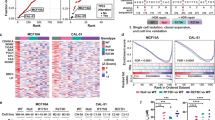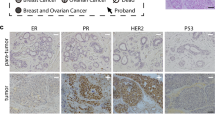Abstract
An oncogenic mutation (G49A:E17K) in the AKT1 gene has been described recently in human breast, colon, and ovarian cancers. The low frequency of this mutation and perhaps other selective pressures have prevented the isolation of human cancer cell lines that harbor this mutation thereby limiting functional analysis. Here, we create a physiologic in vitro model to study the effects of this mutation by using somatic cell gene targeting using the nontumorigenic human breast epithelial cell line, MCF10A. Surprisingly, knock in of E17K into the AKT1 gene had minimal phenotypic consequences and importantly, did not recapitulate the biochemical and growth characteristics seen with somatic cell knock in of PIK3CA hotspot mutations. These results suggest that mutations in critical genes within the PI3-kinase (PI3K) pathway are not functionally equivalent, and that other cooperative genetic events may be necessary to achieve oncogenic PI3K pathway activation in cancers that contain the AKT1 E17K mutation.
This is a preview of subscription content, access via your institution
Access options
Subscribe to this journal
Receive 50 print issues and online access
$259.00 per year
only $5.18 per issue
Buy this article
- Purchase on Springer Link
- Instant access to full article PDF
Prices may be subject to local taxes which are calculated during checkout





Similar content being viewed by others
References
Abubaker J, Bavi PP, Al-Harbi S, Siraj AK, Al-Dayel F, Uddin S et al. (2007). PIK3CA mutations are mutually exclusive with PTEN loss in diffuse large B-cell lymphoma. Leukemia 21: 2368–2370.
Abukhdeir AM, Blair BG, Brenner K, Karakas B, Konishi H, Lim J et al. (2006). Physiologic estrogen receptor alpha signaling in non-tumorigenic human mammary epithelial cells. Breast Cancer Res Treat 99: 23–33.
Arena S, Isella C, Martini M, de Marco A, Medico E, Bardelli A . (2007). Knock-in of oncogenic Kras does not transform mouse somatic cells but triggers a transcriptional response that classifies human cancers. Cancer Res 67: 8468–8476.
Bachman KE, Argani P, Samuels Y, Silliman N, Ptak J, Szabo S et al. (2004). The PIK3CA gene is mutated with high frequency in human breast cancers. Cancer Biol Ther 3: 772–775.
Bleeker FE, Felicioni L, Buttitta F, Lamba S, Cardone L, Rodolfo M et al. (2008). AKT1(E17K) in human solid tumours. Oncogene 27: 5648–5650.
Carpten JD, Faber AL, Horn C, Donoho GP, Briggs SL, Robbins CM et al. (2007). A transforming mutation in the pleckstrin homology domain of AKT1 in cancer. Nature 448: 439–444.
Cohen Y, Shalmon B, Korach J, Barshack I, Fridman E, Rechavi G . (2010). AKT1 pleckstrin homology domain E17K activating mutation in endometrial carcinoma. Gynecol Oncol 116: 88–91.
Davies MA, Stemke-Hale K, Tellez C, Calderone TL, Deng W, Prieto VG et al. (2008). A novel AKT3 mutation in melanoma tumours and cell lines. Br J Cancer 99: 1265–1268.
Debnath J, Muthuswamy SK, Brugge JS . (2003a). Morphogenesis and oncogenesis of MCF-10A mammary epithelial acini grown in three-dimensional basement membrane cultures. Methods 30: 256–268.
Debnath J, Walker SJ, Brugge JS . (2003b). Akt activation disrupts mammary acinar architecture and enhances proliferation in an mTOR-dependent manner. J Cell Biol 163: 315–326.
Denley A, Gymnopoulos M, Hart JR, Jiang H, Zhao L, Vogt PK . (2008). Biochemical and biological characterization of tumor-associated mutations of p110alpha. Methods Enzymol 438: 291–305.
Di Nicolantonio F, Arena S, Gallicchio M, Zecchin D, Martini M, Flonta SE et al. (2008). Replacement of normal with mutant alleles in the genome of normal human cells unveils mutation-specific drug responses. Proc Natl Acad Sci USA 105: 20864–20869.
Fine B, Hodakoski C, Koujak S, Su T, Saal LH, Maurer M et al. (2009). Activation of the PI3K pathway in cancer through inhibition of PTEN by exchange factor P-REX2a. Science 325: 1261–1265.
Gustin JP, Karakas B, Weiss MB, Abukhdeir AM, Lauring J, Garay JP et al. (2009). Knockin of mutant PIK3CA activates multiple oncogenic pathways. Proc Natl Acad Sci USA 106: 2835–2840.
Hayes MP, Wang H, Espinal-Witter R, Douglas W, Solomon GJ, Baker SJ et al. (2006). PIK3CA and PTEN mutations in uterine endometrioid carcinoma and complex atypical hyperplasia. Clin Cancer Res 12: 5932–5935.
Isakoff SJ, Engelman JA, Irie HY, Luo J, Brachmann SM, Pearline RV et al. (2005). Breast cancer-associated PIK3CA mutations are oncogenic in mammary epithelial cells. Cancer Res 65: 10992–11000.
Kim MS, Jeong EG, Yoo NJ, Lee SH . (2008). Mutational analysis of oncogenic AKT E17K mutation in common solid cancers and acute leukaemias. Br J Cancer 98: 1533–1535.
Konishi H, Karakas B, Abukhdeir AM, Lauring J, Gustin JP, Garay JP et al. (2007a). Knock-in of mutant K-ras in nontumorigenic human epithelial cells as a new model for studying K-ras mediated transformation. Cancer Res 67: 8460–8467.
Konishi H, Lauring J, Garay JP, Karakas B, Abukhdeir AM, Gustin JP et al. (2007b). A PCR-based high-throughput screen with multiround sample pooling: application to somatic cell gene targeting. Nat Protoc 2: 2865–2874.
Lauring J, Abukhdeir AM, Konishi H, Garay JP, Gustin JP, Wang Q et al. (2008). The multiple myeloma associated MMSET gene contributes to cellular adhesion, clonogenic growth, and tumorigenicity. Blood 111: 856–864.
Oda K, Stokoe D, Taketani Y, McCormick F . (2005). High frequency of coexistent mutations of PIK3CA and PTEN genes in endometrial carcinoma. Cancer Res 65: 10669–10673.
Perez-Tenorio G, Alkhori L, Olsson B, Waltersson MA, Nordenskjold B, Rutqvist LE et al. (2007). PIK3CA mutations and PTEN loss correlate with similar prognostic factors and are not mutually exclusive in breast cancer. Clin Cancer Res 13: 3577–3584.
Saal LH, Holm K, Maurer M, Memeo L, Su T, Wang X et al. (2005). PIK3CA mutations correlate with hormone receptors, node metastasis, and ERBB2, and are mutually exclusive with PTEN loss in human breast carcinoma. Cancer Res 65: 2554–2559.
Shoji K, Oda K, Nakagawa S, Hosokawa S, Nagae G, Uehara Y et al. (2009). The oncogenic mutation in the pleckstrin homology domain of AKT1 in endometrial carcinomas. Br J Cancer 101: 145–148.
Sjoblom T, Jones S, Wood LD, Parsons DW, Lin J, Barber TD et al. (2006). The consensus coding sequences of human breast and colorectal cancers. Science 314: 268–274.
Stemke-Hale K, Gonzalez-Angulo AM, Lluch A, Neve RM, Kuo W-L, Davies M et al. (2008). An integrative genomic and proteomic analysis of PIK3CA, PTEN, and AKT mutations in breast cancer. Cancer Res 68: 6084–6091.
Vasudevan KM, Barbie DA, Davies MA, Rabinovsky R, McNear CJ, Kim JJ et al. (2009). AKT-independent signaling downstream of oncogenic PIK3CA mutations in human cancer. Cancer Cell 16: 21–32.
Wennstrom S, Downward J . (1999). Role of phosphoinositide 3-kinase in activation of ras and mitogen-activated protein kinase by epidermal growth factor. Mol Cell Biol 19: 4279–4288.
Workman P . (2004). Inhibiting the phosphoinositide 3-kinase pathway for cancer treatment. Biochem Soc Trans 32: 393–396.
Yoon DS, Wersto RP, Zhou W, Chrest FJ, Garrett ES, Kwon TK et al. (2002). Variable levels of chromosomal instability and mitotic spindle checkpoint defects in breast cancer. Am J Pathol 161: 391–397.
Acknowledgements
JL receives support from the Flight Attendant Medical Research Institute (FAMRI), the V Foundation, and the Maryland Cigarette Restitution Fund, National Institutes of Health Grants CA88843, CA088843-08, The Susan G Komen for the Cure Career Catalyst Grant funded by the trust of Ruby J Nelson in loving memory of Charlotte R Nelson, and the Avon Foundation. DC receives support from National Institutes of Health Grant T32 CA09071-27 and a Young Investigator Award from the American Society of Clinical Oncology Foundation. JP Gustin is a recipient of a Department of Defense Breast Cancer Research Program Predoctoral Fellowship Award W81XWH-06-1-0325. JP Garay is a recipient of a Research Supplement to promote diversity in health-related research. HK is a recipient of a Young Clinical Scientist Award from FAMRI. AMA is supported by a Susan G Komen Foundation Postdoctoral Fellowship Award. GW is a recipient of a Medical Scientist Training Program Fellowship. MM is recipient of a Department of Defense Breast Cancer Predoctoral Training Award (BC083057). BHP acknowledges support from the Avon Foundation, Susan G Komen for the Cure, the Mary Kay Ash Charitable Foundation, the Stewart Trust Fund, National Institutes of Health Grants CA109274 and CA88843, FAMRI, and the Breast Cancer Research Foundation.
Author information
Authors and Affiliations
Corresponding authors
Ethics declarations
Competing interests
BHP has received research funding from GlaxoSmithKline in the past, though none of the studies presented here was supported by GlaxoSmithKline. BHP is also a consultant for GlaxoSmithKline and Horizon Discovery Ltd. Under separate licensing agreements between Genzyme Corporation and The Johns Hopkins University, BV is entitled to a share of royalties received by the University on sales of products, though none described in this work. The terms of this arrangement are being managed by the Johns Hopkins University in accordance with its conflict of interest policies.
Additional information
Supplementary Information accompanies the paper on the Oncogene website
Supplementary information
Rights and permissions
About this article
Cite this article
Lauring, J., Cosgrove, D., Fontana, S. et al. Knock in of the AKT1 E17K mutation in human breast epithelial cells does not recapitulate oncogenic PIK3CA mutations. Oncogene 29, 2337–2345 (2010). https://doi.org/10.1038/onc.2009.516
Received:
Revised:
Accepted:
Published:
Issue Date:
DOI: https://doi.org/10.1038/onc.2009.516
Keywords
This article is cited by
-
Distinct functions of AKT isoforms in breast cancer: a comprehensive review
Cell Communication and Signaling (2019)
-
AKT1 E17K mutation profiling in breast cancer: prevalence, concurrent oncogenic alterations, and blood-based detection
BMC Cancer (2016)
-
Overexpression of PIK3CA in murine head and neck epithelium drives tumor invasion and metastasis through PDK1 and enhanced TGFβ signaling
Oncogene (2016)
-
Engineering targeted chromosomal amplifications in human breast epithelial cells
Breast Cancer Research and Treatment (2015)
-
Disruption of epithelial architecture caused by loss of PTEN or by oncogenic mutant p110α/PIK3CA but not by HER2 or mutant AKT1
Oncogene (2013)



